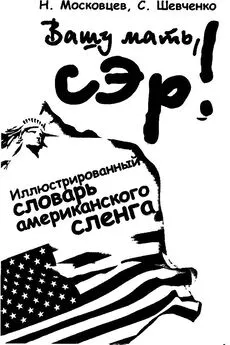Adam Makkai - Словарь американских идиом: 8000 единиц
- Название:Словарь американских идиом: 8000 единиц
- Автор:
- Жанр:
- Издательство:неизвестно
- Год:неизвестен
- ISBN:нет данных
- Рейтинг:
- Избранное:Добавить в избранное
-
Отзывы:
-
Ваша оценка:
Adam Makkai - Словарь американских идиом: 8000 единиц краткое содержание
Это обновленное и дополненное издание, содержащее более 8000 идиоматических
слов и выражений, причем каждое из которых снабжено грамматическим объяснением
и практическим примером. Словарь содержит лексемные идиомы, фразеологические
единицы и поговорки, имеющие особенное значение. В нем приведены наиболее
употребительные выражения только американского английского языка. Этот словарь — идеальное пособие для студентов, часто разъезжающих бизнесменов и просто
путешественников.
Словарь американских идиом: 8000 единиц - читать онлайн бесплатно полную версию (весь текст целиком)
Интервал:
Закладка:
[slip of the lip]See: SLIP OF THE TONGUE.
[slip of the pen] {n. phr.} The mistake of writing something different from what you should or what you planned. •/ That was a slip of the pen. I meant to write September, not November. / •/ I wish you would forget it. That was a slip of the pen. /
[slip of the tongue]also [slip of the lip] {n. phr.} The mistake of saying something you had not wanted or planned to say; an error of speech. •/ No one would have known our plans if Kay hadn’t made a slip of the tongue. / •/ She didn’t mean to tell our secret; it was a slip of the lip. /
[slip one’s mind] {v. phr.} To forget something. •/ I meant to mail those letters but it entirely slipped my mind. /
[slip over]See: PUT OVER(2).
[slip through one’s fingers] {v. phr.} To escape without someone’s knowing how. •/ Policemen surrounded the building, but the thief managed to slip through their fingers. / •/ Mike earns a good wage, but he doesn’t save a penny. Money just slips through his fingers. /
[slipup] {n.} A mistake. •/ "I’m sorry, sir. That was an unfortunate slipup," the barber said when he scratched the client’s face. /
[slip up] {v. phr.} To make a mistake. •/ Someone at the bank slipped up. There are only 48 pennies in this 50c roll of coins. / •/ If he hadn’t slipped up on the last questions, his score on the test would have been perfect. /
[slow burn] {n.} , {informal} A slowly increasing feeling of anger. •/ The boys kept teasing John, and watched him do a slow burn. / •/ Barbara’s slow burn ended only when Mary explained the misunderstanding. /
[slowdown] {n.} A period of lesser activity, usually in the economic sphere. •/ We all hope the current slowdown in the economy will soon be over. /
[slow down] {v. phr.} To go more slowly than usual. •/ The road was slippery, so Mr. Jones slowed down the car. / •/ Pat once could run a mile in five minutes, but now that he’s older he’s slowing down. / Compare: LET UP(2). STEP DOWN. Contrast: SPEED UP.
[slow on the draw] {adj. phr.} Not very smart; having difficulty figuring things out. •/ Poor Eric doesn’t get very good grades in physics; when it comes to problem-solving, he is rather slow on the draw. /
[slow on the uptake]See: SLOW ON THE DRAW.
[slow tune]See: STANDARD TIME.
[slow up] {v.} 1. To go more slowly. •/ The truck slowed up as it approached the toll gate. / •/ Construction on the road slows up traffic. / 2. To become less busy. •/ Business slows up at the stores after Christmas. /
[slug it out] {v. phr.} To have a strong verbal or physical battle with someone; to contest something most vigorously. •/ The two contenders for the lightweight boxing championship were slugging it out in the ring. / •/ The two candidates for Congress were slugging it out on radio and on television. /
[sly]See: ON THE SLY.
[smack-dab]also {southern} [smack-to-dab] {adv.} , {informal} Exactly; squarely. •/ The ball landed smack-dab at our feet. / •/ The plane landed smack-to-dab in the middle of the hay field. /
[smack one’s lips] {v. phr.} To reveal an appetite for; show enjoyment of. •/ Eleanor smacked her lips over the dessert of strawberries and whipped cream. /
[small]See: BIG FROG IN A SMALL POND.
[small frog in a big pond]See: LITTLE FROG IN A BIG POND.
[small fry] {n.} 1. Young children. •/ In the park, a sandbox is provided for the small fry. / 2. Something or someone of little importance. •/ Large dairies ignore the competition from the small fry who make only a few hundred pounds of cheese a year. /
[small]or [wee hours] {n. phr.} The very early hours of the morning between 1 and 4 A.M. •/ My brother was in trouble for coming home in the small hours. / See: WEE HOURS.
[small talk] {n. phr.} General idle conversation. •/ At the party there was the usual kind of small talk about the cost of living increase and the war in Africa. /
[small-time] {adj.} , {informal} Unimportant; minor; with little power or importance. •/ He has a job as a drummer with a small-time band. / •/ It is a small-time business, but it may grow. / Contrast: BIG-TIME.
[small wonder]See: NO WONDER.
[smash hit] {n.} , {informal} A very successful play, movie or opera. •/ The school play was a smash hit. /
[smell a rat] {v. phr.} , {informal} To be suspicious; feel that something is wrong. •/ Every time Tom visits me, one of my ashtrays disappears. I’m beginning to smell a rat. / •/ When the policeman saw a light go on in the store at midnight, he smelled a rat. /
[smell out]See: FERRET OUT.
[smell up] {v.} , {informal} To make a bad smell. •/ A skunk smelled up our yard last night. / •/ Mr. Brodsky’s cigar smelled up the living room. /
[smile]See: CRACK A SMILE.
[smoke]See: CHAIN-SMOKE, GO UP IN FLAMES or GO UP IN SMOKE, PUT THAT IN YOUR PIPE AND SMOKE IT, WATCH ONE’S DUST or WATCH ONE’S SMOKE.
[smoke like a chimney] {v. phr.} , {informal} To smoke very heavily and continuously. •/ "If you continue smoking like a chimney" the doctor told my uncle, "you’ll wind up in the hospital with lung cancer." /
[smoke out] {v. phr.} 1. To force out with smoke. •/ The boys smoked a squirrel out of a hollow tree. / •/ The farmer tried to smoke some gophers out of their burrows. / 2. {informal} To find out the facts about. •/ It took the reporter three weeks to smoke out the whole story. /
[smoke-out] {n.} A successful conclusion of an act of investigative journalism revealing some long-kept secrets. •/ Journalist Bob Woodward was the hero of the Watergate smoke-out. /
[smoke screen] {n. phr.} A camouflage; a veil; something used to cover or hide something. •/ June hides her commercial interests behind a smoke screen of religious piety. /
[Smokey Bear]or [Smokey-the-Bear]or [the Smokies] {n.} , {slang} , {citizen’s band radio jargon} A policeman; a patrol car; frequently abbreviated as Smokey. •/ Slow down, Smokey’s ahead! / •/ A Smokey is on the move, heading east. /
[smooth away] {v.} To remove; (unpleasant feelings) take away. •/ Mr. Jones' new job smoothed away his worry about money. /
[smooth down] {v.} To make calm; calm down. •/ Mrs. Smith’s feelings were hurt and we couldn’t smooth her down. /
[smooth over] {v.} To make something seem better or more pleasant; try to excuse. •/ Bill tried to smooth over his argument with Mary by making her laugh. / Syn.: GLOSS OVER. Compare: PATCH UP.
[smooth sailing]See: PLAIN SAILING.
[snail’s pace] {n.} A very slow movement forward. •/ Time moved at a snail’s pace before the holidays. / •/ The donkey on which he was riding moved at a snail’s pace. /
[snake in the grass] {n. phr.} , {informal} A person who cannot be trusted; an unfaithful traitor; rascal. •/ Did Harry tell you that? He’s a snake in the grass! / •/ Some snake in the grass told the teacher our plans. /
[snap]See: COLD SNAP.
[snap it off]See: MAKE IT SNAPPY.
[snap one’s fingers at] {v. phr.} To show contempt for; show no respect for; pay no attention to; scorn; disregard. •/ John snapped his fingers at the sign that said "Do not enter," and he went in the door. / •/ The highway sign said "Speed limit, 35 miles per hour," but when a driver snapped his fingers at it by going 55 miles an hour, a motorcycle policeman arrested him. /
[snap out of] {v.} , {informal} To change quickly from a bad habit, mood, or feeling to a better one. — Often used with "it". •/ Mary was unhappy when her fiance abandoned her, but she snapped out of it when she met a new young man. / •/ The coach told the lazy player to snap out of it. /
[snappy]See: MAKE IT SNAPPY.
[snapshot] {n.} A small photograph, unlike a professional portrait. •/ We took several snapshots of the scenery while driving around the island. /
[snap up] {v.} , {informal} To take or accept eagerly. •/ Eggs were on sale cheap, and the shoppers snapped up the bargain. / •/ Mr. Hayes told Bob that he would take him skiing, and Bob snapped up the offer. /
[sneak]See: QUARTERBACK SNEAK.
[sneak away]See: SLIP AWAY.
[sneak up on]See: CREEP UP ON.
[sneeze at] {v.} , {informal} To think of as not important; not take seriously. — Used with negative or limiting words and in questions. •/ Mr. Jones was chosen by his party to run for President. He was not elected, but to be chosen to run is not to be sneezed at. / •/ If you think Mrs. Green’s tests are things to be sneezed at, you have a surprise coming. / •/ Is a thousand dollars anything to sneeze at? / •/ John finished third in a race with twenty other runners. That is nothing to sneeze at. /
[sniff out]See: FERRET OUT.
[snow in] {v.} To block up or trap by much snow; keep inside, •/ After the storm the farmer and his family were snowed in for three days. / •/ The train went off the track and the passengers were snowed in for several days. /
[snow job] {n.} , {slang} , {informal} 1. Insincere or exaggerated talk designed to gain the favors of someone. •/ Joe gave Sue a snow job and she believed every word of it. / 2. The skillful display of technical vocabulary and prestige terminology in order to pass oneself off as an expert in a specialized field without really being a knowledgeable worker in that area. •/ That talk by Nielsen on pharmaceuticals sounded very impressive, but I will not hire him because it was essentially a snow job. /
[snow under] {v.} 1. To cover over with snow. •/ The doghouse was snowed under during the blizzard. / 2. {informal} To give so much of something that it cannot be taken care of; to weigh down by so much of something that' you cannot do anything about it. — Usually used in the passive. •/ The factory received so many orders that it was snowed under with work. / •/ The disabled girl was snowed under with Christmas letters. /
Читать дальшеИнтервал:
Закладка:







